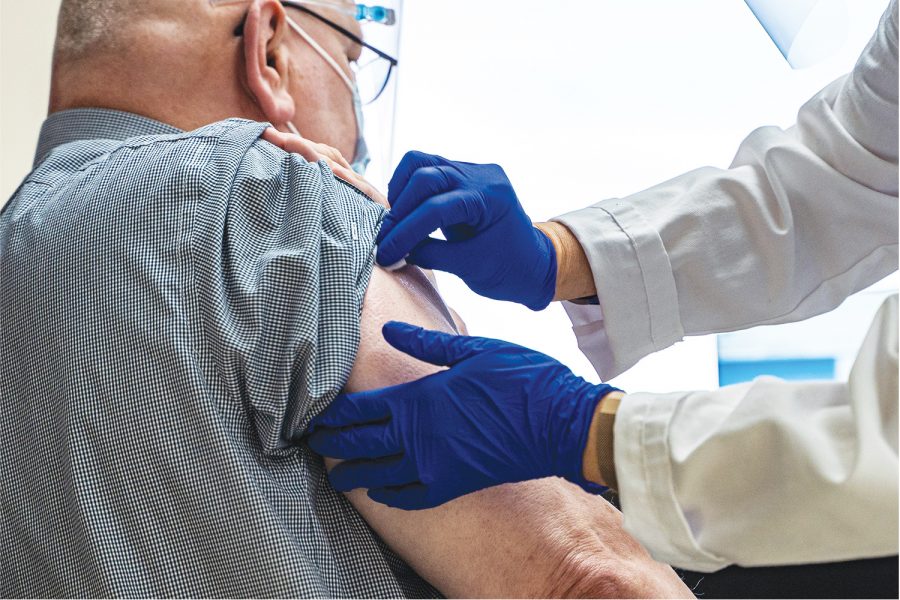Opinion | Gov. Reynolds lack of leadership during COVID-19 hurts Iowa
Iowa’s struggle with COVID-19 is partly due to Reynolds, who never took the pandemic seriously.
August 2, 2021
Iowans put a spotlight on Gov. Kim Reynolds via Twitter throughout the COVID-19 pandemic by labeling her with the hashtag #COVIDKim to express dissatisfaction with her policies or lack thereof.
But while some have spoken out against her ignorance, many have unfortunately mirrored her lackadaisical attitude toward the virus.
From the beginning, Reynolds never took COVID-19 seriously. Instead of making decisions based on the health and safety of Iowans, she chose to play the game of partisan politics that contributed to the politicization and polarization of the virus.
While most of the country shut down in March and April 2020 to slow the spread, Iowa was one of seven states that did not issue stay-at-home orders from non-essential activities. Other governors implemented mask mandates in the early spring to protect their communities, meanwhile, Reynolds did not issue a mandate until November 2020 — the time marked as the deadliest month for COVID-19 for the state.
To no surprise, her choices did not come without consequences. Last year, Iowa became one of the worst states for the spread of COVID-19. Three cities made the top 20 hotspots in the country, and Iowa was ranked as 22nd nationwide for COVID-19 totals. If that was not bad enough, Iowa came in 28th place for daily COVID-19 deaths worldwide, which is why it also made the list of the top 10 riskiest states to visit.
Despite these statistics and ranking at the bottom in vaccine allocations from the federal government at the time, Iowa somehow was one of the first states to relax its restrictions. If you are wondering why this logic is not making any sense, it is because it does not.
Now, with only 49.6 percent of Iowa’s population vaccinated, incentives such as a vaccine lottery and educational resources are examples of possible solutions that have been brought into the conversation to increase vaccination rates.
But one of the major reasons why Iowa is struggling is from the lack of leadership Reynolds displayed throughout the pandemic. Anyone in a leadership position knows that their actions and choices do not just affect those around them, but it also sets a precedent for others to follow.
So, if Iowa’s top dog never treated COVID-19 as an important issue, it is no wonder some Iowans are following her example by not taking the virus seriously and choosing not to get vaccinated.
The effects of her carelessness toward the virus can also be seen from early on, as Iowans’ justifications refused to follow the Centers for Disease Control and Prevention guidelines because of “personal freedom and choice” — two values Reynolds claimed guided her (lack of) COVID-19 policies.
If we want to see improvement in vaccination rates, Iowans need to stop following someone who keeps refusing to devise a defense system against the virus.
Further, why should we follow a policy that does not follow basic science, but also lacks basic common sense?
Banning local and leaders from mandating mask requirements is reckless when evidence proves they are meant to serve as a protection against the virus. Claiming that the CDC is sending mixed messages and questioning its guidance is irresponsible when it is their job to make decisions — which are rooted in factual data and science — based on as the virus changes.
Blaming immigrants, who are 1,400 miles away, does not make any sense when health officials are attributing low vaccination rates to the current spike, which makes Iowa part of the problem, as over half of the population is unvaccinated.
Now denying $100 vaccine incentives from the federal government, it is clear that Reynolds has no intention of changing her approach toward the pandemic. Iowans must listen to science and basic logic instead of someone who never cared about COVID-19 in the first place.
Columns reflect the opinions of the authors and are not necessarily those of the Editorial Board, The Daily Iowan, or other organizations in which the author may be involved.



